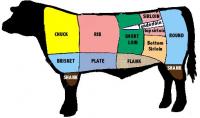Individual lifestyle choices can play a key role in reducing the output of carbon dioxide and other gases generated by human activity that are driving global warming, says the head of the UN’s Nobel Prize-winning scientific panel on climate change.
So instead of simply waiting for governments to take action, individuals can do their part by cutting meat consumption, walking more and buying less.
Rajendra Pachauri an Indian economist and a vegetarian, said the 2007 report of the Intergovernmental Panel on Climate Change (IPCC) highlights “the importance of lifestyle changes,” and the need for people around the world to curb their carnivorous appetites.
Studies have shown producing 2.2 pounds of meat causes the emissions equivalent of 80 pounds of carbon dioxide, Pachauri told a press conference. In addition, raising and transporting that slab of beef, lamb or pork requires the same energy as lighting a 100-watt bulb for three weeks.
“Please eat less meat,” he said, “meat is a very carbon intensive commodity.”
He also advocated cycling or walking “instead of jumping in a car to go 500 metres,” and urged consumers to purchase only what they really need instead of buying something “just because it’s there.”
If you like this story, please consider voting for it on Digg.com by clicking here.
Subscribe to our newsletter
Stay up to date with DeSmog news and alerts







